
[image caption]
Fifty Years of Excellence
UC Berkeley's Rausser College of Natural Resources celebrates a milestone anniversary
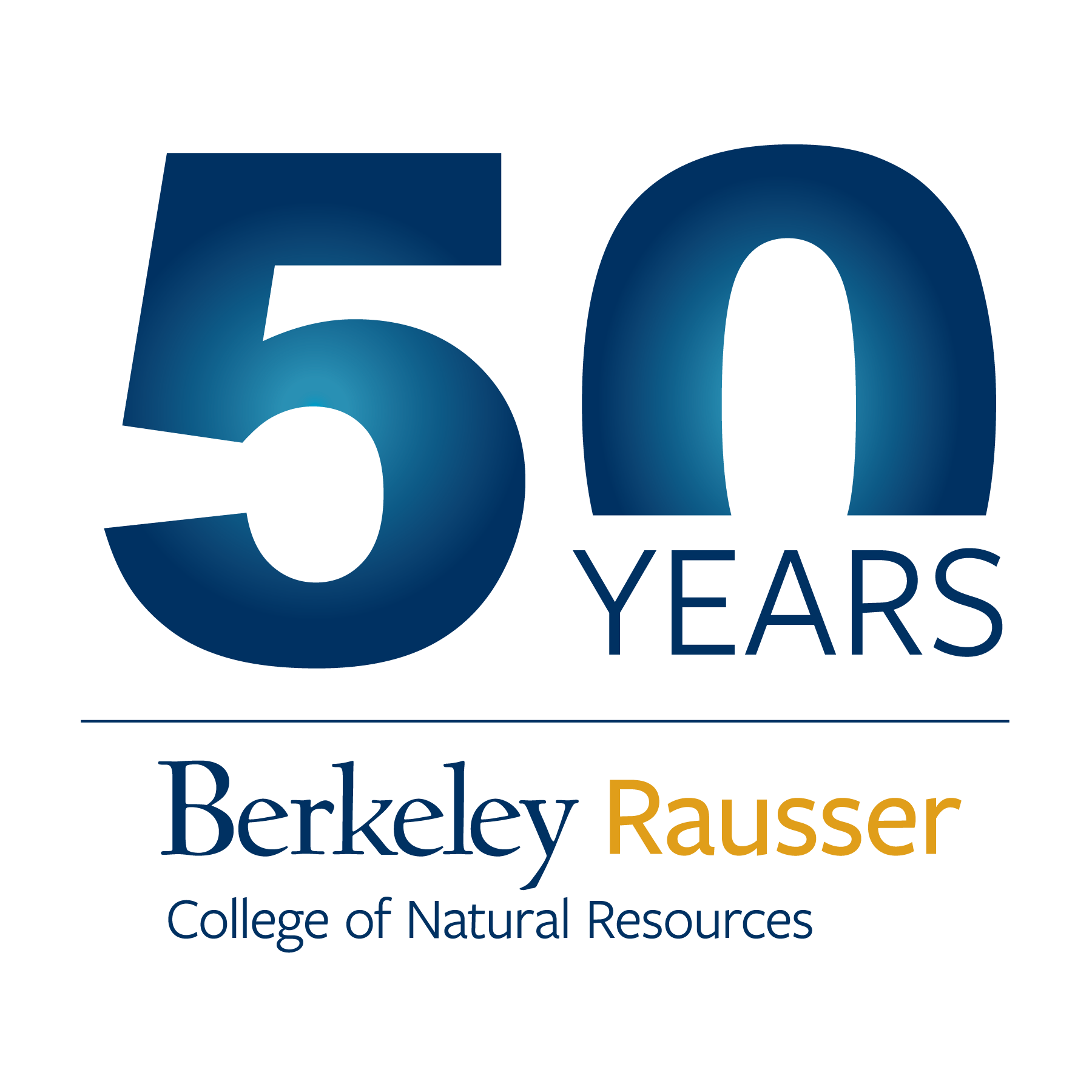
This month officially marks 50 years since the founding of the College of Natural Resources at UC Berkeley. The College has already launched a special issue of Breakthroughs magazine, published other stories in honor of the anniversary, and installed commemorative banners around campus, and is planning a number of celebratory events for the coming months.
In the first course catalog for the newly formed College of Natural Resources in 1974, acting dean Loy L. Sammett wrote that the philosophical direction of the new College lay in the belief that “our renewable resources must be used in ways that are at once productive, conservative of those resources, and protective of environmental quality.”
Half a century later, Rausser College of Natural Resources remains grounded in that belief and is a leader in cutting-edge research, exceptional educational opportunities, and creating connections between science and society through outreach, policy, and community engagement—with the unifying goal of responsibly stewarding our natural resources and creating a sustainable global future for all.
“The College of Natural Resources was born during a time when major federal laws were first being enacted to control air and water pollution, the Environmental Protection Agency was established, and people were waking up to the need to protect our planet,” said former UC Berkeley Chancellor Carol T. Christ, who retired on June 30. “Even as environmental issues grow in complexity and urgency—and our understanding of these issues expands—the College has remained at the forefront of interdisciplinary, bold, responsive research and education that keep at their center the incalculable bond between humans and nature.”
Building on strong foundations
Rausser College of Natural Resources traces its roots back to 1868, when California legislators—supported by the federal Morrill Act—established the University of California in Berkeley and the College of Agriculture as the first land-grant college in the state. As the College grew, so did its mandate; research and instruction relating to forestry, human health, and other fields were added through the late 1800s and early 1900s, expanding on its origins as an agricultural teaching and experimentation station. By 1946, the UC Regents approved the formation of the School of Forestry at Berkeley, which allowed the program to grow and introduce a fifth year of graduate-level education in forestry.

[image caption]
Over the years, the University of California launched agricultural and veterinary research in Davis, which served as a division of the College of Agriculture until the Regents promoted it to a general campus of UC in 1959. A series of proposed and enacted restructurings occurred at Berkeley and across the greater UC during the 60s, prompting the leaders of the UC Berkeley College of Agriculture and the School of Forestry and Conservation to explore a merger. In 1974 the biological, environmental, and food sciences departments from the two schools combined to form the College of Natural Resources.
In 1992 the College of Natural Resources underwent a major reorganization, which involved restructuring the College's eight departments into four: Environmental Science, Policy and Management; Agricultural and Resource Economics; Nutritional Sciences (now Nutritional Sciences and Toxicology), and Plant Biology (now Plant and Microbial Biology). The Energy & Resources Group officially joined the College in 2011.
In 2020, the College was renamed the Rausser College of Natural Resources in honor of former Dean Gordon Rausser’s landmark $50 million gift, which has enabled our research, teaching, and public service initiatives to thrive and has sustained our core excellence and financial strength.
Now, Rausser College is celebrating 50 years of impact while also planning for the next half-century and beyond. “This 50th anniversary is an incredible chance to celebrate the many achievements of the College community so far,” said David Ackerly, dean of Rausser College of Natural Resources. “With the strong foundation of excellence established over the past five decades, we are proud to continue as a global leader in research, education, and outreach—advancing the fields of biosciences, food, and health; catalyzing solutions to the climate crisis; and fostering thoughtful stewardship of natural resources.”
Groundbreaking research, innovative solutions
Since its formation in 1974—and for more than a century before that—the College of Natural Resources has helped position UC Berkeley at the forefront of research and academics. Students and faculty contribute to the societal understanding of natural and human systems from biological, ecological, economic, and social science perspectives.
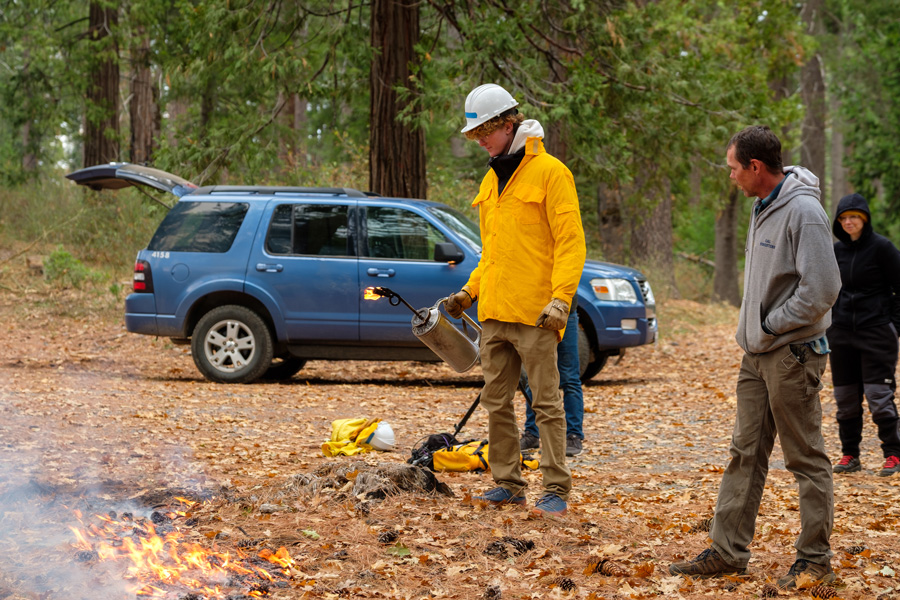
[image caption]
- Our forestry program dates back to 1914 and builds on more than a century of research, teaching, and outreach focused on understanding forests as complex ecosystems that provide invaluable environmental and social benefits. We address the growing crisis of climate-driven wildfires and disease by testing novel ecological theories and innovative management practices; partnering with public agencies, private landowners, and California’s tribal communities; and engaging with state and federal policy makers to develop sustainable management practices. Researchers and land managers at Berkeley Forests, one of the nation’s premier interdisciplinary research centers, steward just under 10,000 acres of forestland on behalf of California and UC Berkeley.
- Generations of entomologists across the globe trace their roots to UC Berkeley’s teaching and research. Our faculty members were at the forefront of developments in Integrated Pest Management and biocontrol, a technique that utilized living organisms—rather than chemicals or pesticides—to control pests and other nuisances. That research helped prevent the transmission of insect-borne diseases like Lyme disease and “river blindness” among people, and Pierce’s disease across grapevines. Others studied how DDT and synthetic pesticides affected insect and human health, or how insects and pests adapt to and thrive in urban environments.
- Throughout the history of the College, women have contributed to its diverse and comprehensive research and discoveries, including many “firsts,” both within their respective fields and at Berkeley. In 1874, the university’s first female graduate, Rosa L. Scrivner, earned a degree in agriculture from the College of Agriculture, Rausser College's predecessor. Women from the College were instrumental in negotiating the early maternity leave policy for faculty at Berkeley in the 1980s, served as the first women in important leadership roles across campus and the University of California, and were among the first female forestry professionals with the U.S. Forest Service. Many have been tireless advocates for diversity and equity in the College, across the University, and in their respective fields of research.

[image caption]
- Many within the College have dedicated their careers to understanding the challenges posed by climate change, and the analysis of potential solutions. Their work has demonstrated how everything—from the birds and the bees to the forests and the seas—has changed under a hotter, more volatile climate. And as local and global leaders rally to limit future warming, they increasingly turn to Rausser College’s social scientists to understand the economic and political repercussions of our warming planet. Everything from energy markets to environmental regulations within the U.S. and abroad has been shaped by research on the cost of carbon emissions, clean energy development, and related fields.
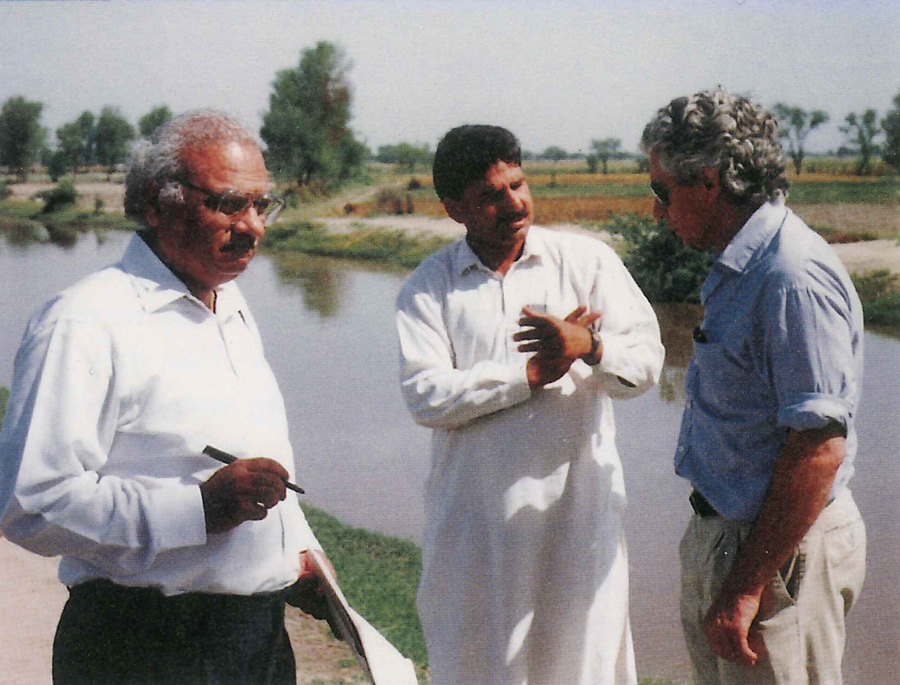
[image caption]
- College economists have helped address nearly every critical agricultural and natural resource issue—from pest resistance to pesticide residues, water pollution to water markets, and biodiversity to international agricultural development and trade—in California and across the globe. They routinely partner with outside groups to improve resource sustainability, food security and safety, and environmental quality in rural and urban communities. Their impact can also be seen overseas, where their expertise has been used to shape aid policies and external investment in developing countries with the goal of improving financial conditions and addressing growing inequities.
- Our faculty also conduct research across social and biological sciences to understand the factors that shape the global food system and seek innovative and equitable solutions that benefit human and ecosystem health. Their research laid the groundwork for farms within California and across the globe to adopt modern irrigation technology and integrate the use of computers to increase crop yields and decrease costs. Some choose to investigate whether changes in soil composition or farming practices can be used to make farms more productive and resilient. Others are building on foundational discoveries relating to photosynthesis, microbiology, plant genetics, and disease resistance to enhance plants and crops to fight pathogens, improve crop yields, and store more carbon.
- Our pioneering studies of the metabolic interaction of nutrients, phytochemicals, and toxicants in living organisms have advanced scientific understanding of human health. Faculty have helped set nutritional guidelines and dietary allowances, isolated essential nutrients that govern bodily functions, and made groundbreaking advances in the prevention of chronic health conditions like obesity, diabetes, heart disease, and cancer. They have also trained more than five decades of dietitians on how to translate scientific research into practical solutions for addressing nutritional challenges and promoting health and wellness.
Exceptional teaching and mentorship
Alongside our cutting-edge research, Rausser College faculty and staff are lauded for providing outstanding teaching, hands-on research opportunities, and exceptional mentorship to undergraduate and graduate students.
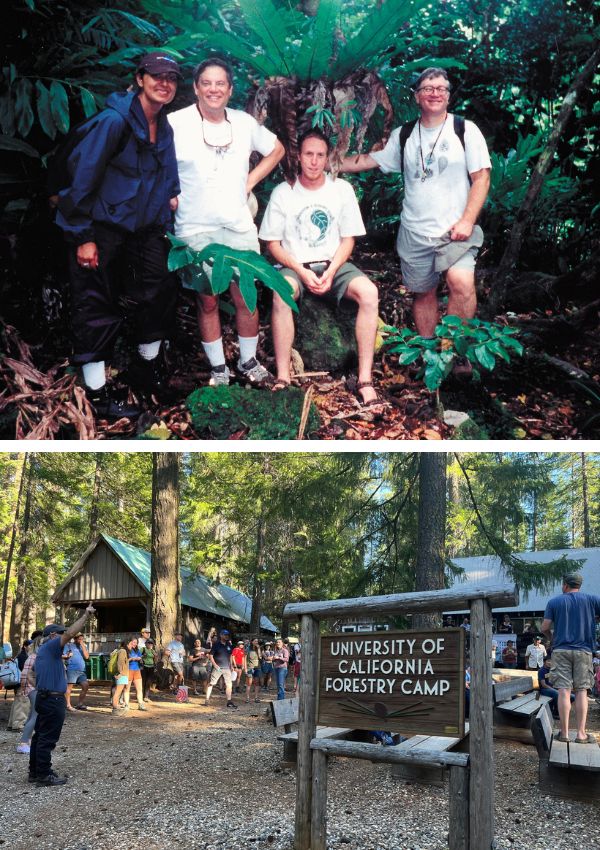
[image caption]
- The Conservation and Resources Studies major, originally called Conservation of Natural Resources, began in the ’70s as a student and faculty-led initiative and was a first-of-its-kind program centered around democratic, interdisciplinary scholarship. Students earned credit for practical experiences including fieldwork, internships, and community involvement at the time of the program’s inception. Much of the program’s core elements remain today.
- Many alums cite their experiences outside the classroom as highlights of their time in the College. For example, students in the Biology of Fungi class have the opportunity to hunt for mushrooms on campus, within the Bay Area, and during their annual trip to Mendocino. Since 1991, students have had the opportunity to enroll in an immersive, semester-long field research course at the Gump Research Station on Mo’orea, French Polynesia. The College is also home to the only immersive forestry field course in the West, which has been running continuously since 1915, and offers students the opportunity to work alongside faculty and forestry professionals.
- Thousands of students have conducted hands-on research since the Sponsored Projects for Undergraduate Research (SPUR) program launched nearly two decades ago. Our generous community of alumni and friends supports this program, which promotes undergraduate participation in faculty research projects and also allows students to design their own projects with mentorship and advising from a faculty member or postdoc. Undergraduates also have the opportunity to collaborate with faculty on a year-long independent research project by participating in the College’s honors program.
- The College has also invested in broadening the student experience through programs that are made possible by the gifts of donor alumni and friends. Students who participate in independent research projects or attend an academic conference are eligible to apply for funding designed to offset the cost of travel. And since 2019, summer internship grants have been available to help qualifying undergraduates meet basic living expenses while pursuing unpaid or low-paying internships.
Taking science to the world
Beyond supporting the next generation of leaders, Rausser College faculty and alums continue to work across public and private sectors to turn their science into solutions for real-world problems.
- As the campus hub for the University of California Agricultural Experiment Station (AES), Rausser College is part of a nationwide network of land-grant universities dedicated to research in food systems, natural resources, and the health and welfare of rural communities. More than 100 AES projects are currently in development at UC Berkeley, including research on enhancing sustainable agriculture by unraveling plant-microbiome interactions, reducing wildfire risk to improve forest health and human well-being, managing the resilience of California’s inland fishes, climate change impacts on water demand, and nutritional regulation of aging and disease.
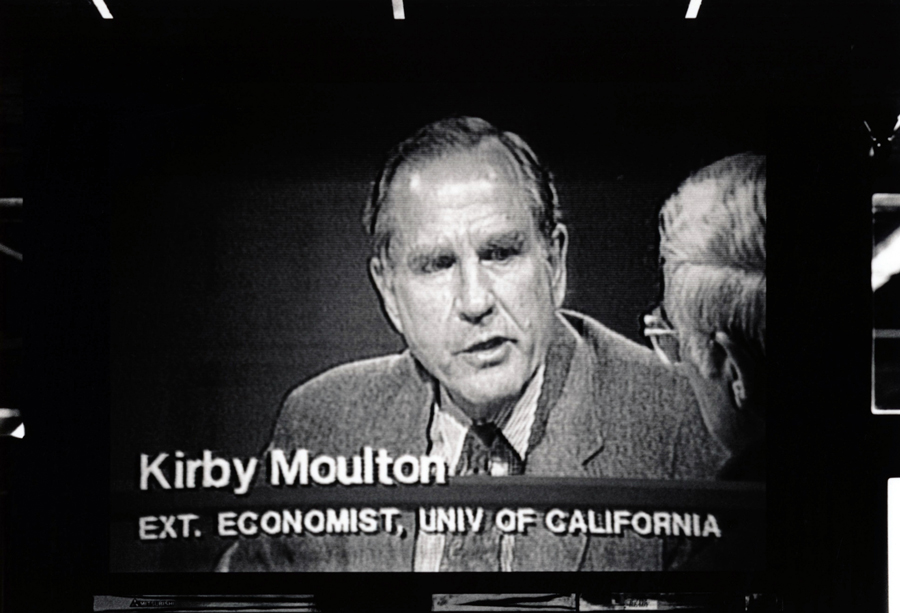
[image caption]
- The College’s two dozen Cooperative Extension Specialists use their training and expertise to address the needs of Californians related to water management, forests and wildfires, biodiversity conservation, pest and disease control, agriculture, climate change, community health, and nutrition. These problem-solvers, catalysts, collaborators, and educators also conduct applied research and coordinate outreach activities to support working practitioners across the state.
- More than 700 global environmental leaders and sustainable development specialists from 114 countries have sought the practical training offered by the Beahrs Environmental Leadership Program, an interdisciplinary certificate for mid-career professionals. Since 2000, this program has prepared participants to become successful environmental stewards through a mix of lectures, site visits, case studies, panels, and workshops led by college faculty and affiliates. Participants return to their home institutions to implement the skills and tools they acquired at the end of the two-week program.
- Faculty and alums have been appointed to a litany of public task forces, working groups, and advisory roles. Many have applied their research to reshape policies relating to biodiversity and landscape conservation within California, across the nation, and around the globe. Others have guided economic development agencies; advised presidential administrations on science, technology, energy, and equity; and contributed to global treaties on climate and carbon emissions. Their impact and influence can still be seen within institutions like the U.S. National Park System, the U.S. Forest Service, the USDA, and more.

[image caption]
- Private companies have also sought out the College’s expertise and pursued creative and innovative partnerships that augment the University’s public mission. These arrangements have provided students and faculty with the funding to pursue novel research, scale their ideas beyond a proof of concept, and support efforts to bring these innovations to market. Some continued these efforts at companies that produce plant-based alternatives to animal products, engineer bacteria to recover valuable elements or clean toxic environments, and scale carbon management markets.
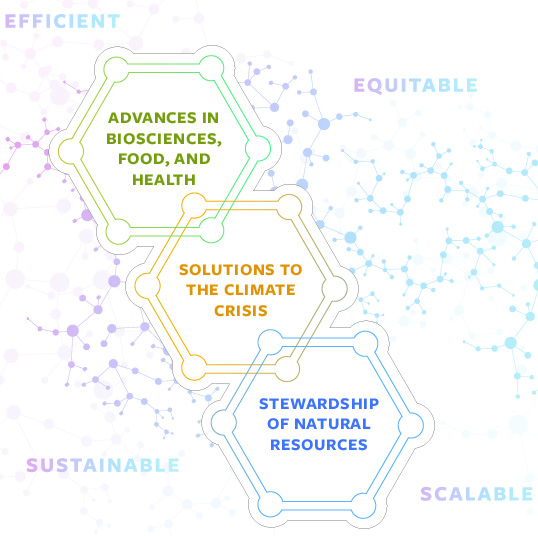
[image caption]
- The College’s active and emerit faculty members have earned recognition from several national and international organizations. Multiple faculty contributed substantially to reports that earned the Intergovernmental Panel on Climate Change a Nobel Peace Prize. Three researchers earned the prestigious Wolf Prize in Agriculture, which is often likened to a Nobel Prize in the field. Countless have been honored by professional groups and societies that advance research in their respective fields.
Looking ahead
As we enter our second half-century, Rausser College is committed to a renewed vision of creating equitable, efficient, and innovative solutions that address the climate crisis, promote ecological and economic sustainability, responsibly steward natural resources, and improve human health and well-being.
The College is taking action to advance Diversity, Equity, Inclusion, Belonging, and Justice (DEIBJ) across the University. In 2020 we appointed the College’s first Associate Dean of Equity and Inclusion and we are now building on that momentum as we recruit a new Assistant Dean of Equity and Inclusion. We also support the efforts of Rausser College community members to incorporate inclusion and anti-racism in the classroom, foster new generations of diverse scholars, and support equity and safety in field research settings.
Rausser College led the cluster hire in Climate Equity and Environmental Justice, which resulted in an interdisciplinary group of leading scholars who are dedicated to research on human-induced climate change and the disparate impact it has on marginalized, racialized, and underrepresented groups.
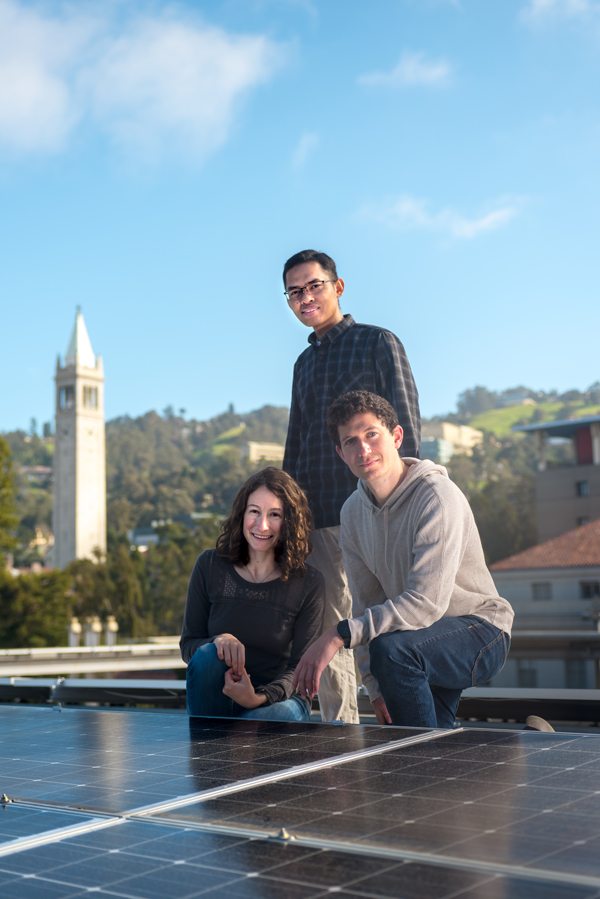
[image caption]
In its 50th year, the College is launching a brand new Master of Climate Solutions program, to empower the next generation of climate and sustainability leaders with the skills and knowledge needed to enact real solutions and create change. “Rausser College’s impact is multiplied through our alumni, who are tackling the complex and urgent issues of this generation in a diverse array of pursuits and positions all around the world,” said Ackerly. “Through the new Master of Climate Solutions program we can connect Berkeley’s leading experts with even more students who can swiftly apply their learnings in real settings and advance our shared goal for a transition to a more just, inclusive, and ecologically friendly world.”
“Today’s immense challenges require innovative solutions that will benefit both humanity and the natural world,” said Rich Lyons, who became Berkeley’s 12th chancellor on July 1. “It’s stunning what the College has achieved across so many fields, from human health, to resilient food and ecological systems, to producing food, energy, or industrial products with biological resources or waste. Rausser College is leading the way toward a more just, clean, and sustainable future.”
Read More
- 50 years and counting: Did you know that research in the College of Natural Resources inspired Michael Crichton to write Jurassic Park? Or that a strain of bacteria developed by our faculty is used in making artificial snow? Or that the College of Natural Resources was almost called the College of BioResources? In our spring magazine, we highlight many fun facts—and big impacts—from our first five decades.
- In Photos: In honor of the 50th anniversary, we combed our archives for photos that offer a look back at the College of Natural Resources through the decades.
- Enter the 50th anniversary photo contest: Help celebrate the 50th anniversary of Rausser College of Natural Resources by entering our 2024 photo contest! Submit your original photos for a chance to win prizes and to have your work featured in Rausser College publications and social media. For this special 50th anniversary photo contest, we also welcome historical photos you may have in your files.
